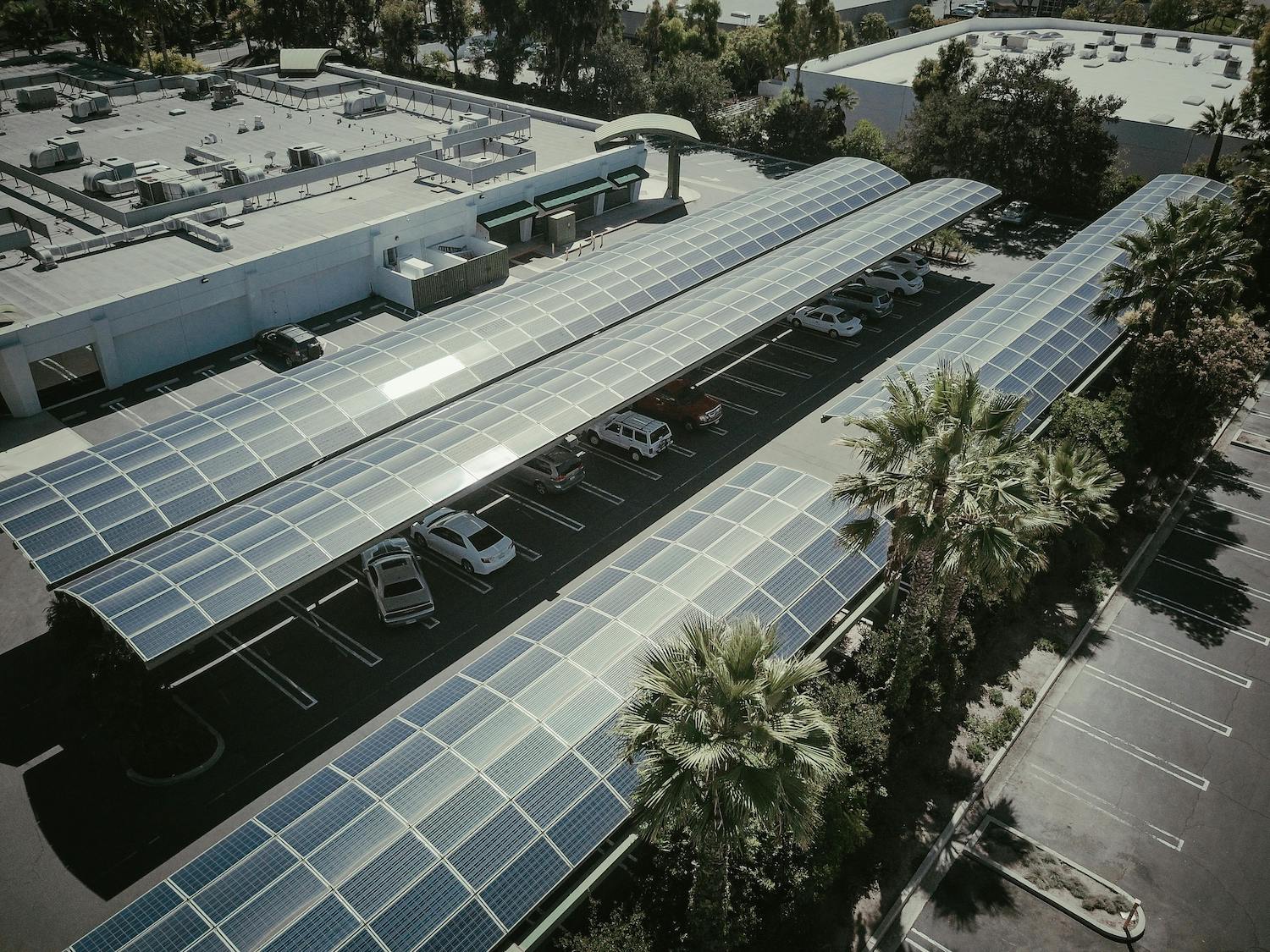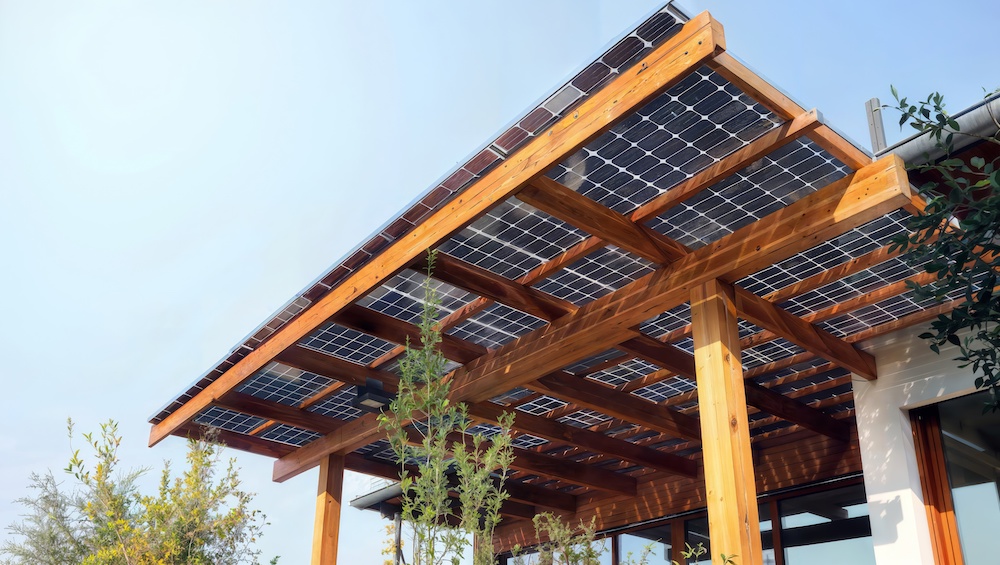
Find out what solar panels cost in your area
Solar canopies are a great way to take advantage of the benefits of solar and also provide shady coverings for backyards, parking lots, and more.
Building a solar canopy can also be an excellent solution for homes and businesses that don’t have a suitable roof for solar panels.
Key takeaways
-
Solar canopies are structures designed to hold overhanging solar panels while providing usable space underneath.
-
Solar canopies generate solar power, which reduces energy costs, while allowing functional use of the space underneath.
-
Solar canopies can, however, take many other forms, including commercial solar carports (the most common use), residential solar carports, solar pergolas, solar gazebos, and even solar patio covers.
-
For a small to mid-sized home, a solar canopy will cost anywhere between $5,000 and $32,600. The final price depends on many factors.
-
Companies like Brooklyn Solar Canopy specialize in prefabricated solar canopy structures, but any professional local solar company can perform the installation for you.
What is a solar canopy?
A solar canopy is a custom-built outdoor structure designed to hold an overhanging solar array. They allow for distributed solar energy generation, i.e. the production of solar electricity on-site.
‘Solar canopy’ is an umbrella term of sorts, as it is used to describe a number of different solar structures:
Solar carports
Solar patio covers
Solar pergolas
Solar gazebos
Each type of solar canopy is designed to allow functional use of the space underneath the solar panels. This is a key advantage of solar canopies, and its main point of difference compared to other mounting methods, namely rooftop and ground-mounted solar panel installations.
Thanks to big drops in the price of solar panels and generous incentives like the solar tax credit, solar canopies offer home and business owners substantial energy savings.
About solar parking canopies (aka solar carports)
Solar parking canopies - otherwise known as solar carports or solar parking lots - are the most common type of solar canopy structure.
Commercial solar carports
An increasing number of solar carports are being used in outdoor parking lots that are attached to commercial buildings like malls, shopping centers, supermarkets and electric vehicle charging stations.
Commercial solar carports have multiple advantages, including:
Do not require any additional real estate - you can build the solar canopy atop existing parking spaces
Offer an alternative to installing on the rooftop, which might not be possible due to structural or design issues
Improve customer parking experience by offered shade from the sun and protection from the rain
Provide a visual reminder of a company’s commitment to sustainable, clean energy - more so than out-of-sight solar panels, or simply purchasing green energy from the utility
Residential solar carports
Solar carports often appeal to owners of Teslas and other EVs, since they can use them as a parking spot and as a charging station. And when the vehicle isn’t there, the energy system’s power output can be sent to the home or exported to the grid for bill credits.
But solar panel carports aren’t just for EV owners. Many homeowners don’t want solar panels on their rooftops - either because their roofs are due for replacement soon, or because they don’t want to spoil their home’s aesthetic. And unless you live out in the country, you probably don’t want to tie up land with ground-mounted solar panels. In these situations, a solar carport installation is an excellent option.
Here are the reasons why homeowners choose solar carports for their homes:
Offers a sheltered parking area if you don’t have garage space
Allows you to charge your emissions-free electric car with renewable energy
It’s cheaper to charge an EV with solar than with grid electricity
A great alternative if your house isn’t suitable for rooftop solar
Learn more: Tesla charging - How much does it cost and how long does it take?
Other types of solar canopies: Solar gazebos, pergolas, and solar patio covers

A backyard solar pergola, depicted with generative AI. Image: VITALII - stock.adobe.com
While solar parking canopies grab all the attention, they’re not the only kind of solar canopy structure to consider. Solar pergolas, patio covers, and gazebos are solar canopy structures that work great in outdoor spaces like parks and backyard gardens.
A key advantage of such structures is that they create a shaded area for people and pets to relax under. This space can be used for seating, a hot tub, or as a picnic or barbeque spot.
These are a great option where the roof isn’t suitable for installing panels, but you have backyard space to work with.
Learn more: A quick guide to solar pergolas, patio covers, and gazebos
How much do solar canopies cost?
It’s hard to throw out a single figure given the large number of variables involved.
The total cost depends on how large a solar canopy structure you want, the size of the solar system you want on it, the quality of the equipment used, and local installation prices where you live.
Below, we’ve provided ranges for how much a typical solar canopy installation might cost.
Cost for DIY solar canopy
A DIY solar canopy for a home will typically cost between $5,000 - $14,000.
There are two parts to a solar canopy installation - the canopy structure and the solar system.
The canopy structure (without the solar equipment) will typically cost between $500 and $5000 to build, depending on the size and materials used.
The solar system - including the panels, solar inverters, mounting equipment, and necessary wiring - will have an installation cost of $3,500 to $9,000. This assumes a solar panel kit between 3.5 kW and 6 kW in size - enough to power a small to medium sized home - and a cost per watt of $1.50 for the solar panel kit.
Cost for professional installation with pre-engineered canopy
A professional solar canopy installation for your home, built with a high quality pre-engineered canopy structure, will cost between $19,050 and $32,600.
Again, you can divide the job into two parts. The first is the purchase of the construction of the canopy structure, and the second is the solar panel installation, which covers solar equipment, labor, and permitting.
For the canopy structure, we can assume a price of between roughly $10,500 and $15,500. These prices are based on offerings from Brooklyn Solar Canopy, which offers high-quality modular and adjustable solar canopy structures made out of aluminum alloy.
For the solar panel installation, we’re looking at a cost of between $9,000 and $18,000. These costs are based on the national average solar panel installation cost of $3.00 per watt, and assumes a system size of between 3 kW and 6 kW (the same sizes we used in the DIY option above).
Commercial solar canopies
SolarReviews focuses on residential solar, so our data for commercial solar installations is limited.
However, Solar Electric Supply provides prices for solar carport equipment and has a listed price of $67,275 for a 50 kW solar carport system. This equals $1.35 per watt. Do note, however, that this is equipment cost only, and costs can easily double or more after accounting for permitting and labor.
Pros and cons of solar canopies
Pros
-
Offers usable space underneath the panels
-
Can be installed in many different locations
-
Can be designed with optimal solar panel direction and angle in mind
-
Overhang design is well-suited for bifacial solar panels
Cons
-
Costs more than rooftop solar
-
Special building permit may be required
Pros
Versatility: Structures can be used for a variety of purposes
Location flexibility: Can go in parking lots, parks, backyards, attached to buildings
Solar optimization: When designing custom-built solar canopy structures you can adjust the orientation and angle of the panels to ensure high solar power production (unlike with roof installations, where you’re stuck with what you've got)
Bifacial-friendly: Solar canopies allow the use of bifacial solar panels, the increased efficiency of which can help offset the higher cost of the mounting structure
Cons
Higher costs: The cost of materials and labor to build the structure means that solar canopies generally cost more than rooftop installations
Permit requirements: Many areas require a building permit from the Authority Having Jurisdiction (AHJ) for a solar canopy or similar structure; this is additional to the permitting required for a solar installation
The best companies for solar canopies
Solar canopy structure: For residential installations, I recommend Brooklyn Solar Canopy. I visited their booth at the Solar Power International exhibition in 2019 and was impressed by their modularity and flexibility, their industrial look and the large amounts of space offered under the canopy. Other companies providing prefabricated solutions are Lumos Solar, Orion Carports, and Schletter Solar.
All-in-one solar canopy kits: Solar Electric Supply is a well-established retailer of solar equipment and kits. They offer commercial solar carport equipment ranging from 50 kW to 1,000 kW in size.
Complete solar canopy installation: Most solar installers have experience installing solar panels in a variety of different settings on a variety of different structures. As such, we recommend searching for the best solar installation companies in your area and discussing your needs with them.
Zeeshan is a solar journalist who has long been passionate about climate issues and developed a deep interest in solar power after witnessing its successful adoption in Australia. He has previously worked as a journalist for a major news organization, covering energy, climate, and environmental stories, among other topics. He also served as an organizer for the Pakistan Youth Climate Network, an advocacy group aimed at raising climate awareness...
Learn more about Zeeshan Hyder